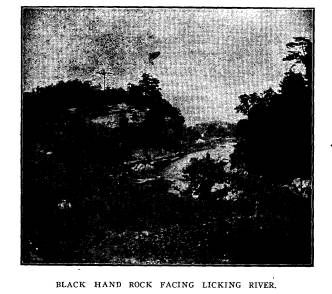Ohio History Journal
The Black Hand. 455
the rock was in mute appeal and forcibly
reminded the wayfarer in
a way at once forcible, as it was
poetical, that thus far and no
farther should the waves of unglutted
vengeance roll. The hand
marked the portal of a sanctuary which
was sacred to the
savage, whose lust for blood rose above
every other considera-
tion in his narrow but intense, isolated
but eventful life.
THE CHIEFTAIN WACOUSTA, THE YOUNG
LAHKOPIS, AND
THE MAIDEN AHYOMAH.
MRS. DAVID GEBHART.
"An unremembered Past
Broods like a presence, midst
These cliffs and hills."
Many moons ago, long before the pale
face came across
the Great Water to this land, here upon
the bank of the Pataskala,
was the lodge of the great chief
Powkongah, whose daughter
Ahyomah was fair as the dawn and
graceful as the swan that
floats on the lake. Her eyes were soft
and shy as the eyes of a
young deer, her voice sweet and low as
the note of the cooing
dove. Two braves were there who looked
upon her with eyes of
love, and each was fain to lead her from
the lodge of her father,
that she might bring light and joy and
contentment to his own.
At last said the chief, her father,
"No longer shall ye contend for
the hand of Ahyomah, my daughter. Go ye
now forth upon the
war path, and when three moons have
passed see that ye come
hither once more, and then I swear by
the Great Spirit that to
him who shall carry at his belt the
greatest number of scalps
shall be given the hand of Ahyomah, my
daughter." Three
months had waxed greater and grown less
ere the warriors re-
turned. Then, upon the day appointed,
behold, all the tribe gath-
ered to view the counting of the scalps.
First stepped forth Wa-
cousta, a grim visaged warrior, who had
long parted company
with fleet-footed youth, and walked
soberly with middle man-
hood. From his belt he took his
trophies, one by one, and laid
them at the feet of the chief, while
from behind the lodge door
Ahyomah, unseen by all, looked fearfully
forth upon the scene.
With each fresh scalp the clouds settled
more and more darkly
|
456 Ohio Arch. and Hist. Society Publications.
upon the bright face of Ahyomah, and her lip trembled as she murmured, "So many! so many!" Then came the second brave, Lahkopis. Young was he, with the light of boyhood still lingering in his eyes, but upon his head the eagle feather, telling withal of a strong arm and deeds of bravery. One swift glance he shot towards the lodge of the unseen maiden, then he loosed his belt, and laid it at the feet of Powkongah. Scalp after scalp they counted, while the people bent forward silently, and a little hand drew aside the curtain from the lodge doorway, and a young |
|
|
|
face looked anxiously yet hopefully forth. Slowly, slowly they laid them down, and at last, behold there was one more, just one more than in the pile of Wacousta. The young Lahkopis had won! Now strode forth Wacousta, and laid his hand--the strong right hand, that yet had failed to win the prize--laid it upon a rock. Then lifted he his tomahawk high in the air, and with one swift stroke severed the hand at the wrist, and flung it high up against the face of the cliff, saying. "Stay thou there forever as a mark of scorn in the eyes of all men, thou hast let |
The Black Hand. 457
thyself be beaten by the cunning right
hand of a boy! Disgraced
thou art, and no longer shalt thou be
numbered among the
members of my frame." And the hand
clung to the rock and
turned black, and spread and grew until
it was as the hand of
a giant; and while the chief, Ahyomah
and the tribe stood silently
watching the wonder, the defeated
warrior wrapped his robe
about him, spoke no word of farewell,
and striding swiftly into
the dark depths of the forest, was seen
no more by man.
THE BLACK HAND.
HON. ALFRED KELLEY.
Have you ever seen the place where the
murderer's hand
Had instamped on the rock its indelible
brand,
A stain which nor water nor time could
efface?
'Tis a deep lonely glen, 'tis a wild
gloomy place,
Where the waters of Licking so silently
lave,
Where the huge frowning rock high
impends o'er the wave,
On whose pine-covered summit we hear the
deep sigh
When the zephyrs of evening so gently
pass by.
Here a generous savage was once doomed
to bleed,
'Twas the treacherous white man
committed the deed.
The hand of the murderer fixed the
imprint,
'Twas the blood of the victim that gave
the black tint.
A captive in battle the white man was
made,
And deep in the wilds is the victim
conveyed,
Here far from his kindred the youth must
be slain,
His prayers, his entreaties, his
struggles are vain.
The war dance is treading, his death
song is singing,
And the wild savage yell in his ears is
a-ringing.
The fire for the torture is blazing on
high,
His death doom is sealed, here the white
man must die,
The hatchet is raised, the weapon
descends,
But quick an old chief o'er the victim
now bends.
The hatchet he seizes and hurls to the
ground.
He raises the youth and his limbs are
unbound.
"My son fell in battle,"
exclaims the old chief,
"But ye saw not my sorrow, tho'
deep was my grief,
